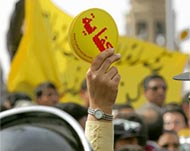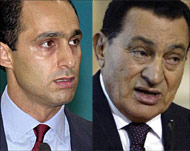Egyptians ponder Mubarak’s reforms
Egyptian political analysts are welcoming President Hosni Mubarak’s surprise about-turn on constitutional amendments, but warn stumbling blocks still stand in the way of full electoral reform.

From the local traditional cafes to their homes, Egyptians watched glue-eyed as Mubarak spelled out his “full conviction of the need to consolidate efforts for more freedom and democracy” in a mid-morning address carried live on local television.
Egyptian commentators and the press had been for weeks following demonstrations calling for constitutional reform and for multi-candidate elections in September.
Now, the media focus has shifted to ensuring the September elections herald a new era of freedoms in the country.
“The most important thing is to guarantee the transparency of the elections,” said Mustafa Bakri, editor of the weekly political magazine al-Osboa.
“Transparency of the elections require certain electoral mechanisms which in the end will lead us to believe in the results achieved.”
Internal pressures
But Bakri dismissed notions that Mubarak’s announcement came as a result of external pressures.
 |
|
Protesters holding ‘Enough’ signs |
“This amendment has been under study for the past two months when Mubarak formed a workgroup consisting of consultants and advisers to ensure such an amendment [to the constitution] was feasible.
“I think in general this is a victory and a response to the demands of Egyptian citizenry,” he added.
Hasan Nafaa, head of the Political Science Department at Cairo University, agrees that in the end it was internal pressures that pushed the government to act.
“Despite the presence of external pressures on the regime we can’t underestimate the internal pressures of the opposition,” he said
Devil in the details
But Nafaa also warns that Mubarak’s announcement may not go far enough unless amendments are made to two articles of the constitution, both pivotal to any electoral reform.
|
“We need the terms the president is allowed to run for to be limited to a maximum of two terms of five years each” Abd Allah Al-Sinawi, |
“If this amendment is limited to Article 76, without going further to Article 77, which determines the length of presidential terms, it won’t affect the current status of the political regime,” Nafaa said.
“Now the terms are not limited which allows the president to get re-elected indefinitely. I think that the amendment must include Article 77.”
Abd Allah Al-Sinawi, editor-in-chief of the Al-Arabi newspaper believes that Mubarak’s announcement is a partial victory for the opposition’s demands.
He, like Nafaa, argues any future constitutional amendments should set limitations on presidential powers.
“We need the terms the president is allowed to run for to be limited to a maximum of two terms of five years each,” Al-Sinawi said.
Stumbling block
Despite the welcome surprise Mubarak’s announcement created among members of the opposition parties, there are warnings that several stumbling blocks lie ahead.
 |
|
Will opposition parties be able to |
Nafaa and Al-Sinawi believe that impetus should be placed on the Egyptian government to revise emergency laws which have been in place since the 1981 assassination of President Anwar al-Sadat.
Without changes or cancellation of the emergency laws, they say, ordinary Egyptian citizens would be barred from running as candidates in any elections and the list of those eligible would be limited to the opposition parties already in existence.
The process of registering new parties must be streamlined, Nafaa said.
But Ibrahim Isa, senior member of the Al-Ghad (Tomorrow) opposition party, says without cancelling emergency laws the “proposed amendments will end up destroying any real political and democratic reform”.
“He [Mubarak] is putting conditions for those who want to run for the presidency such as recommendations from the People’s Assembly and local assembies.
“In Egypt these assemblies are monopolized by the ruling party,” he said, adding that such impediments and others will “abort any real democratic development in Egypt”.
Mobilising the opposition
Bakri believes opposition parties may be in a state of confusion, having been caught off guard by the suddeness of Mubarak’s speech.
“Opposition parties are seen now to be in a dilemma. They don’t know who to present as candidates and which of them will win the acceptance of the people,” he said.
 |
|
Opposition groups feared Jamal |
Despite the challenges that await the opposition parties as they rise to the latest promised electoral reforms, the most shared sentiment among Egyptians is that they may have just witnessed the beginning of a new era in the country’s democratisation.
“We may agree and disagree on different issues, but we all have to agree that this issue rather surprises and yet brings happiness to all of us,” said Salah Montasir, a popular columnist for Al-Ahram daily newspaper.
Montasir says that since the 1920s, constitutional reforms had been carried out for the benefit of the ruling party and/or president. Mubarak’s latest pledge, however, is aimed at embracing popular sentiment and to push the country forward.
“We have been used to electing a president with a simple yes or no. Now there is a difference. This is not a step for beautifying the Egyptian regime. It is rather a practical amendment for the sake of the people to help them run for the elections,” he said.